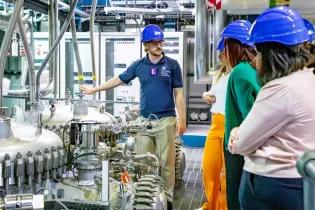Edinburgh and the University of York are partnering with the UK Atomic Energy Authority (UKAEA) in a £7.8 million joint investment to support fusion energy research and postgraduate training.
The funding aims to help further the UK’s expertise in fusion energy, which is a potential source of sustainable electricity.
Sustainable electricity
Fusion energy is generated by heating two forms of hydrogen to form plasma that is 10 times hotter than the Sun’s core.
When the two types of hydrogen fuse together – forming helium – energy is released that can be harnessed to produce electricity.
New centre
Edinburgh will create a new centre to apply its expertise in theoretical physics to the challenge of developing and containing fusion plasmas.
The Centre for Plasma Theory will bring together the University’s Schools of Mathematics and Physics and Astronomy.
It will also be a focal point for cross-disciplinary training and wider engagement activities, preparing young people for fusion careers and helping to increase the UK’s scientific and industrial capacity.
Widening access
Scholarships to widen access to fusion training will be made available as part of the award, helping to remove financial barriers for students from a range of backgrounds.
The University will also develop a fusion energy stream within some of its existing MSc programmes.


